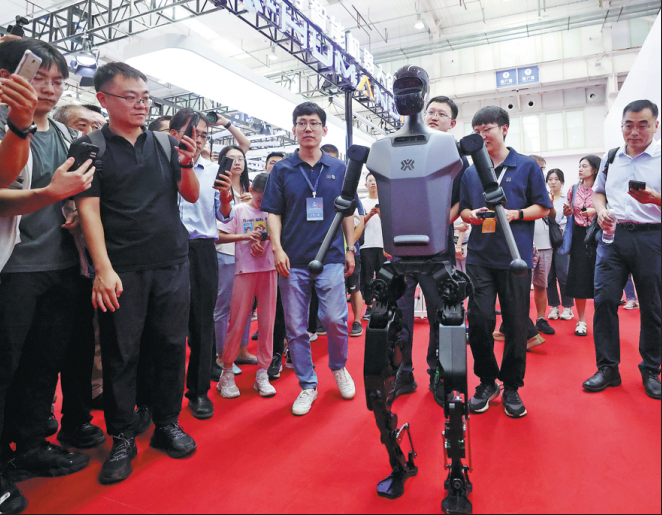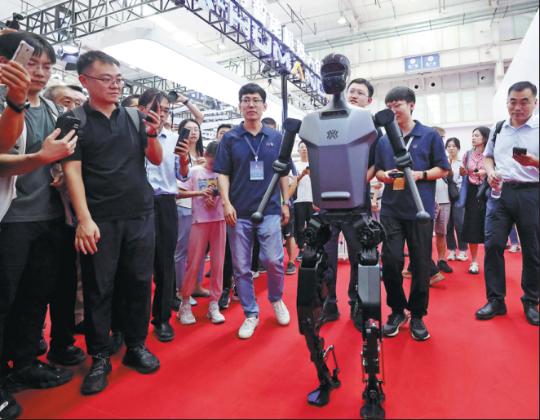Event stresses global ties to spur robots' role

A robot on display at the 2024 World Robot Conference, which kicked off in Beijing on Wednesday. (LI MUYI/FOR CHINA DAILY)
Heightened efforts are needed to strengthen international cooperation in the robotics industry, speed up the application of robots in a wider range of industries, and jointly build efficient and stable robotics industry and supply chains, said officials, experts and company executives at a global industry event on Wednesday.
Speaking at the opening ceremony of the five-day 2024 World Robot Conference, which kicked off in Beijing on Wednesday, Xin Guobin, vice-minister of industry and information technology, said China is willing to work with the international community to bolster robotic technology innovation and industrial development.
China will also welcome global stakeholders to grow their businesses in the country, encourage Chinese robotic companies to go global, and augment the use of robots in various fields like intelligent manufacturing and healthcare, he said.
Highlighting the pivotal role of robots in promoting the in-depth integration of artificial intelligence and real economy, Xin called for efforts to carry out basic research on robots and achieve breakthroughs in core technologies of key fields, so as to promote the high-quality development of the country's robotics industry.
As of July, China owned more than 190,000 effective robot-related patents, accounting for about two-thirds of the global total. The country has maintained its position as the world's largest industrial robot market for 11 consecutive years, he noted.
He further said that robot density in the manufacturing industry reached 470 robots per 10,000 employees, and service robots have been used in multiple sectors on a large scale, including family services, health and elderly care, adding that the average annual growth rate of China's robotics industry is 15 percent.
Data from the National Bureau of Statistics showed that the output of industrial robots in the country has increased from 33,000 units in 2015 to 430,000 units in 2023, with a compound annual growth rate of 37.8 percent. The output of robots used in the services sector jumped 21.3 percent year-on-year to 7.83 million units last year.
Marina Bill, president of the International Federation of Robotics, said China has made remarkable achievements in the robotics industry in recent years, emerging as the world's largest consumer market and a leading producer of robots. "Since 2013, China has consistently maintained the top position in global robot installations, playing a vital and irreplaceable role on the international stage."
Chinese products such as collaborative robots, logistics robots and underwater robots have gained prominence in the international market, capturing a significant share of the total, she said.
Bill, who is also the global head of marketing and sales and head of product line software and digital in industrial conglomerate ABB's robotics division, said, "China is actively promoting the research and development and application of humanoid robots, injecting new vigor and vitality into the diverse development of global robotics technology."
She also called on governments, businesses and research institutions worldwide to strengthen dialog and collaboration, and promote the profound integration of innovative technologies like generative AI and digital twins with robotics.
"International collaboration is obviously a fundamental pillar for the sustained growth and prosperity of the robotics industry," said Alois C. Knoll, a professor at the Technical University of Munich in Germany.
The deep integration of technologies like AI has made robots smarter, more flexible and more autonomous, Knoll said, underlining that these advancements not only boost production efficiency but also play a vital role in supporting the sustainable development of society.
He said the conference has served as a prominent platform for actively promoting the deep integration of robotics technology across various sectors, while setting a very good example for promoting innovation and global cooperation in the robotics field.
Zhang Jin, president of Chinese robotics maker Siasun Robot &Automation Co, said the company will continue to step up investment in R&D, enhance indigenous innovation capabilities and expand its footprint in the industrial robots segment.
At the conference, Siasun is showcasing a series of AI-powered robots, which could be used in semiconductor manufacturing, automated production lines, factory and warehouse cleaning work, and as family companions.

